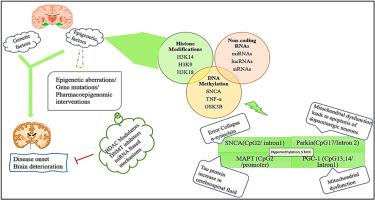Neuroprotective potential of Epigenetic modulators, its regulation and therapeutic approaches for the management of Parkinson's disease
IF 4.2
3区 医学
Q1 PHARMACOLOGY & PHARMACY
引用次数: 0
Abstract
The progressive degeneration of dopaminergic neurons in the substantia nigra region of the brain leads to a deficiency of dopamine and, ultimately, the onset of Parkinson's disease (PD). Since there is currently no cure for PD, patients all around the world are dealing with symptomatic management. PD progression is influenced by multiple elements, such as environmental, biological, chemical, genetic, and epigenetic factors. Epigenetics is gaining increased attention due to its role in controlling the expression of genes that contribute to PD. Recent advancements in our understanding of the brain network and its related conditions have shown that alterations in gene expression may occur independently of genetic abnormalities. Therefore, a thorough investigation has been carried out to explore the significance of epigenetics in all degenerative disorders. Epigenetic modifications are essential for regulating cellular homeostasis. Therefore, a deeper understanding of these modifications might provide valuable insights into many diseases and potentially serve as targets for therapeutic interventions. This review article focuses on diverse epigenetic alterations linked to the progression of PD. These abnormalities are supported by numerous research on the control of gene expression and encompass all the epigenetic processes. The beginning of PD is intricately associated with aberrant DNA methylation mechanisms. DNA methyltransferases are the enzymes that create and preserve various DNA methylation patterns. Integrating epigenetic data with existing clinical methods for diagnosing PD may aid in discovering potential curative medicines and novel drug development approaches. This article solely addresses the importance of epigenetic modulators in PD, primarily the mechanisms of DNMTs, their roles in the development of PD, and their therapeutic approaches; it bypasses other PD therapies.

表观遗传调节剂的神经保护潜力、对帕金森病的调控和治疗方法。
大脑黑质区域的多巴胺能神经元逐渐退化,导致多巴胺缺乏,最终引发帕金森病(PD)。由于帕金森病目前尚无根治方法,全世界的帕金森病患者都在接受对症治疗。帕金森病的进展受多种因素的影响,如环境、生物、化学、遗传和表观遗传因素。表观遗传学在控制导致帕金森病的基因表达方面的作用日益受到关注。最近,我们对大脑网络及其相关情况的了解取得了进展,这表明基因表达的改变可能与遗传异常无关。因此,我们对表观遗传学在所有退行性疾病中的重要性进行了深入研究。表观遗传修饰对调节细胞的平衡至关重要。因此,深入了解这些修饰可能会为许多疾病提供有价值的见解,并有可能成为治疗干预的靶点。这篇综述文章重点探讨了与帕金森病进展相关的各种表观遗传学改变。这些异常得到了大量关于基因表达控制的研究的支持,并涵盖了所有的表观遗传过程。帕金森病的发病与异常的DNA甲基化机制密切相关。DNA 甲基转移酶是创建和保存各种 DNA 甲基化模式的酶。将表观遗传学数据与诊断帕金森病的现有临床方法相结合,有助于发现潜在的治疗药物和新型药物开发方法。本文仅讨论表观遗传调节剂在帕金森病中的重要性,主要是 DNMTs 的机制、它们在帕金森病发展中的作用及其治疗方法;本文绕过了其他帕金森病疗法。
本文章由计算机程序翻译,如有差异,请以英文原文为准。
求助全文
约1分钟内获得全文
求助全文
来源期刊
CiteScore
9.00
自引率
0.00%
发文量
572
审稿时长
34 days
期刊介绍:
The European Journal of Pharmacology publishes research papers covering all aspects of experimental pharmacology with focus on the mechanism of action of structurally identified compounds affecting biological systems.
The scope includes:
Behavioural pharmacology
Neuropharmacology and analgesia
Cardiovascular pharmacology
Pulmonary, gastrointestinal and urogenital pharmacology
Endocrine pharmacology
Immunopharmacology and inflammation
Molecular and cellular pharmacology
Regenerative pharmacology
Biologicals and biotherapeutics
Translational pharmacology
Nutriceutical pharmacology.

 求助内容:
求助内容: 应助结果提醒方式:
应助结果提醒方式:


